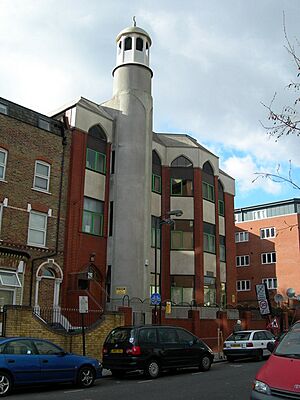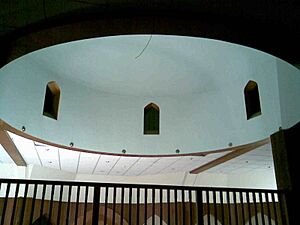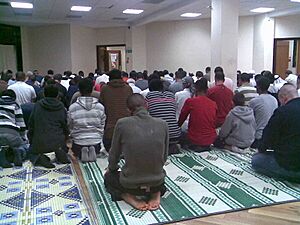Finsbury Park Mosque facts for kids
Quick facts for kids Finsbury Park Mosque |
|
|---|---|
|
North London Central Mosque
|
|
 |
|
| Religion | |
| Affiliation | Muslim Council of Britain |
| Leadership |
|
| Location | |
| Location | Finsbury Park, London United Kingdom |
| Architecture | |
| Architectural type | Mosque |
| Date established | founded 1988, main building 1994 |
| Specifications | |
| Capacity | 2,000 |
| Minaret(s) | 1 |
| Website | |
| https://finsburyparkmosque.org/ | |
The Finsbury Park Mosque, also known as the North London Central Mosque, is a large mosque in London. It has five floors and is located near Finsbury Park station. It is also close to Arsenal Football Club's Emirates Stadium in the London Borough of Islington. This mosque serves the Muslim community in Islington and other parts of North London. It is officially registered as a charity in England.
The mosque became well-known when Abu Hamza al-Masri, a preacher who was later found guilty of terrorism, became its leader in 1997. In 2003, the mosque was temporarily closed by its leaders after a police raid. It reopened in 2005 with new leadership.
Contents
History of Finsbury Park Mosque
Early Years: 1988 to 1997
In the 1960s, a small room in a guest house was used as a prayer space. It served the few Bangladeshi Muslims living in the area. As the Muslim community grew, this small room was no longer big enough.
In 1975, the community formed the Muslim Welfare Centre. They bought their own property and later added more land. A mosque first opened on this site in 1988. At that time, it was one of the largest mosques in the UK. In 1994, a new five-story mosque building officially opened. Important people like Prince Charles and King Fahd of Saudi Arabia attended the opening. King Fahd had also helped fund the building.
Challenging Times: 1997 to 2003
The mosque gained a lot of attention after Abu Hamza al-Masri became its imam, or leader, in 1997. During this period, he and his followers took control of the mosque. They stopped people they did not trust from entering.
The mosque's original leaders asked Abu Hamza to leave. They said he used intimidation. In 1998, they went to court to stop him from preaching. They won a court order, but it was not put into action. Many leaders reported being blocked from their own mosque. Some even said they were attacked by Abu Hamza's supporters. In 2002, the Charity Commission for England and Wales told Abu Hamza to stop preaching, but he continued.
During Abu Hamza's time, fewer people attended the mosque. Most attendees were his followers. The mosque also became a meeting place for some radical individuals. Some people linked to terror activities visited the mosque. In 2002, The Guardian newspaper reported that weapons training had taken place inside the building.
Abu Hamza was later charged by the United States as a "terrorist facilitator." He was arrested and sentenced to prison in the UK in 2006. He was then sent to the United States, where he received a life sentence.
Reopening and New Beginnings: 2003 to 2005
In 2003, about 150 anti-terrorist police officers raided the mosque. This was part of an investigation. Police found a stun gun and a CS gas canister. They arrested seven men. This police action helped remove Abu Hamza and his supporters from the mosque.
After the raid, the police gave the mosque back to its leaders. They closed it for repairs and cleaning. The leaders said they were cleaning it of "physical and spiritual filth." Abu Hamza continued to preach outside the closed mosque until his arrest in 2004.
In August 2004, the mosque reopened. However, there were reports that some hardliners tried to take control again. The Charity Commission stepped in and appointed a new group of leaders. This new group had the support of the Muslim Association of Britain (MAB). They were asked by the police and former leaders to help turn the mosque around. After taking control of the building, the mosque reopened with a strong police presence.
Dr. Azzam Tamimi, a leader from MAB, called the mosque's takeover a "success story." He said the Muslim community and others worked together to save the mosque. The new management strongly spoke out against former imam Abu Hamza.
Positive Changes: 2006 to 2013
Since reopening, the Finsbury Park Mosque has been known for its positive changes. It is no longer linked with radical views. British authorities have called the mosque's transformation a big achievement. The Telegraph newspaper reported that the mosque went from a "radical hotbed" to a "model of community relations." It is now seen as a success story.
The mosque worked hard to build good relationships with the local community. This included working with local MP Jeremy Corbyn. It also started to connect with non-Muslims and local authorities.
Recent Events: 2014 to 2016
In 2014, HSBC Bank closed the mosque's bank account. The mosque could not open an account with other major banks. It had to use a smaller Islamic bank. This closure happened because of information in a database called World-Check. This database mentioned past links to terrorism before 2005. It also mentioned links of a current mosque leader to the Muslim Brotherhood. The mosque filed a legal case against Thomson Reuters, who owned World-Check. The case was settled in 2017. Reuters agreed to apologize and pay damages.
In August 2014, police came to the mosque after a disagreement. It was between an Al Arabiya reporter and the mosque's manager. Both men called the police. The manager said the reporter was doing "malicious journalism." The reporter said he was held by the manager until police arrived.
In January 2015, after the Charlie Hebdo shooting in Paris, the mosque received threats. Its past links to radical preachers were mentioned again. In November 2015, someone tried to set fire to the mosque. The attack failed because of heavy rain. In July 2016, a man threw rotten pork meat at the mosque.
2017 Terrorist Attack
On June 19, 2017, shortly after midnight, a terrible event happened. Several worshippers were leaving the Finsbury Park Mosque. They were hit by a hired van in a terrorist attack. One person died, and ten others were injured. This attack was widely condemned. Local Muslim leaders saw it as part of a rise in Islamophobia in the United Kingdom. After the attack, Mohammed Kozbar, the chairman of the mosque, said they received many death threats. In February 2018, the attacker, Darren Osborne, was sentenced to life in prison.
Community Connections
The Finsbury Park Mosque has received awards for its community work. In 2018, it won the "Best outreach programme" award at the British Beacon Mosque Awards. The mosque is also part of the Islington Faith Forum. This forum received the Queen's Award for Voluntary Service in 2018. The mosque is also connected to the Muslim Council of Britain.
The mosque often hosts events for the local community. Local MP Jeremy Corbyn, police, and councillors use the venue for meetings and speeches.
The mosque organizes many community events each year. This includes an annual open day for local people and schools. Since 2014, this event has been part of the national Visit My Mosque Day scheme. Visitors can tour the mosque and see an exhibition about Islam. There are also many activities organized by community members.
Since the 2017 Finsbury Park terror attack, the mosque has held an annual Street Iftar event. This happens during the month of Ramadan. The local and wider community are invited to share a meal. This meal happens when Muslims break their fast. Many faith leaders, local councillors, and MPs have attended this event.
The mosque has also supported other causes. It was part of the Macmillan Coffee Morning to raise money for cancer patients. It also held the first "Autism hour" in a mosque with the National Autistic Society.
The mosque has hosted many Hate Crime Awareness events. In 2015, it started the "Meals for All" program. Through this, the mosque provides a hot meal once a week for homeless people and those in need.
See also
 In Spanish: Mezquita de Finsbury Park para niños
In Spanish: Mezquita de Finsbury Park para niños
- Islam in London
- Islamic schools and branches
- Islam in the United Kingdom
- List of mosques in the United Kingdom
 | James Van Der Zee |
 | Alma Thomas |
 | Ellis Wilson |
 | Margaret Taylor-Burroughs |



